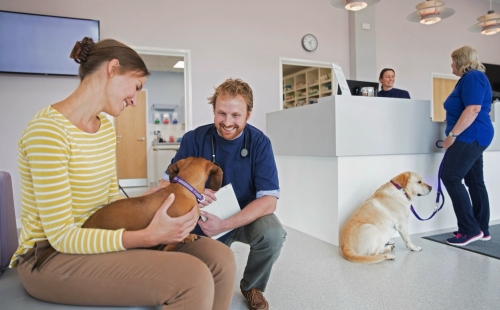The ROI of Pet Wellness Plans in Veterinary Practice

In a busy veterinary hospital, it's easy to expend all your energy on urgent cases and emergencies. However, when you look at the big picture of sustainability and profitability in a veterinary practice, preventive care has the most potential for long-term value.
Adoption of pet wellness plans is low, despite evidence that they’re a great source of revenue. Veterinary professionals and leaders can benefit from taking a second look at wellness plans as a business decision that can improve their veterinary hospital’s return on investment (ROI).
Preventive care revenue streams
Pet wellness plans are often misunderstood as discount programs, but when designed correctly, they can become a sustainable revenue stream and improve overall preventive care compliance. The plans bundle routine care services, including vaccinations, checkups, dental care, heartworm testing, screening diagnostics, and others needed to complete a year’s worth of care into a predictable monthly fee.
When pet owners enroll in a wellness program, they’re locked into an annual contract that imposes a “use it or lose it” mentality. As a result, participating clients are more likely to follow through with recommended care, including high-value services like dental care. Compliance equals better pet health outcomes, which help further establish trust and loyalty.
Building loyalty by reducing healthcare costs
Pet parents want to do the right thing and provide all services recommended for their pets, but cost often gets in the way. Pet wellness plans help to make care more affordable by spreading out payments. They also encourage more clients to purchase services and pay for them in advance, which means hospitals can provide those services at a more reasonable price. Relying on low-cost, high-volume wellness services is a pricing strategy that can help bring in more new clients and support higher prices for advanced services.
Plans can also help reduce long-term health care costs for the client and the hospital by identifying issues earlier through more frequent screenings. Early detection benefits patient well-being, team mental health, and your reputation in the community.
Pet wellness plans as marketing tools
Another hidden benefit to preventive care plans is their ability to serve as powerful marketing tools. In a crowded veterinary industry, offering wellness plans can set you apart. The plans speak directly to budget-conscious pet owners and those who would otherwise skip wellness care, such as many cat owners.
Use the plans to power a social media campaign centered around pet wellness and watch plan signups attract new clients to your veterinary business. Wellness plans can also help initiate conversations about pet insurance, including how wellness plans differ from insurance policies and how the two can work together for ultimate financial protection.
Making pet wellness work for your practice
Successful wellness plan implementation doesn’t have to be a costly endeavor. Partnering with a plan provider that integrates with your existing practice management software can save you from paying for additional software or hardware to get the program off the ground. Additional tips for success include:
- Ask a few select clients to pilot a simple plan for a discount so you can work out the kinks.
- Bundle services you already use and recommend to avoid adding new workflows.
- Train team members to explain the value of each plan and answer questions confidently.
- Track ROI in your practice management system by choosing a key metric to follow after implementing the plans.
- Review demographics and plan adoption rates to adjust to client needs over time.
Quality of life for pets and their people
A hidden benefit of investing in preventive care plans is the well-being that the plans can bring to the hospital ecosystem. Plans can:
- Reduce surprise bills and difficult conversations.
- Empower clients to prioritize preventive care.
- Give your team confidence that they’re doing the right thing for pets.
- Provide recurring revenue that supports raises and other hospital investments.
Pet wellness plans are practical tools that support pet health, practice profitability, and long-term client relationships. They can align the needs of your hospital with the needs of pet parents, delivering value you can measure and care your team can feel good about.



